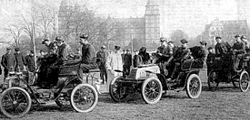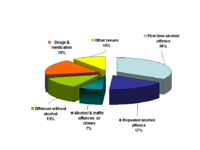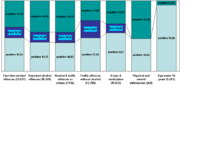
Medical Psychological Assessment
Encyclopedia
The Medical Psychological Assessment (MPA) is a German measure ruled by law for persons seeking to regain their driving licence.

 The MPA has an interdisciplinary basic approach. Although it is considered a punishment by many offenders, it offers them the chance to rehabilitate themselves. German medical-psychological institutes issue about 100,000 MPAs a year. Many of their clients have to take the MPA twice because more than 50% fail to get a positive opinion on their first try.
The MPA has an interdisciplinary basic approach. Although it is considered a punishment by many offenders, it offers them the chance to rehabilitate themselves. German medical-psychological institutes issue about 100,000 MPAs a year. Many of their clients have to take the MPA twice because more than 50% fail to get a positive opinion on their first try.


History
The first standards mandating the MPA for certain prospective drivers were legally adopted in 1955. Its stated purpose was to improve traffic safety and reduce the number of accidents by identifying unfit dangerous drivers and removing them from traffic until fitness to drive was restored.
Drunk drivers
The prerequisites for operating a motor vehicle are only met once the level of alcohol consumption has changed appropriately. The change in drinking behaviour must be stabilised and motivationally consolidated. Passing the MPA is not easy: Drunk drivers with a blood alcohol level of 0.16% or more must establish that they have been completely abstinent for at least one year; test administrators corroborate drivers' certifications (formal statements) as to their abstinence by measuring their liver function levels and conducting random urine screenings.Other offences
A conviction for driving while impaired by alcohol and/or drugs is not the only scenario in which in which the MPA can be imposed. Many test subjects who have ridden a motorcycle under the influence or who regularly use drugs must present a favorable MPA opinion to the license-issuing agency by a certain deadline (usually several weeks after an incident) or face suspension of their driver's licenses. This justification for requiring an MPA opinion enables the government to suspend the licenses of many alcoholics who were not apprehended while driving drunk.

